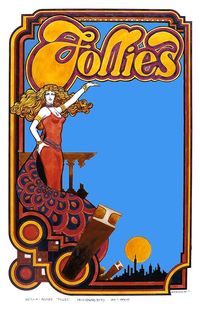They've dropped the "Kowalski" from Stanley's name in new Streetcar revival
#175A middle aged streetcar
Posted: 4/7/12 at 6:02pm
Had Blanche been treated by a progressive shrink who concludes that she is not insane, I have no doubt that she would be released. As for how upon her release she might be able to start anew, perhaps ending up the owner of a fashionable dress shop in the Quarter.... this all reminds me too much of the debate I got in with you, Gaveston, long ago, about how Nora might be able to pull herself together after she closes the door on Torvald. I believe fate can take odd turns and with some luck people can find themselves having unexpected success. It is possible. You seem to view this as so unlikely in dire social circumstances that it is hardly worth considering. So, rather than rehashing that, we should perhaps agree to disagree.
And who might this young progressive New Orleans Dr. who helps Blanch be? Well none other but Williams' own Dr. Cukrowicz of course!
Updated On: 4/8/12 at 06:02 PM
Gaveston2
Broadway Legend Joined: 6/28/11
#176A middle aged streetcar
Posted: 4/7/12 at 10:46pm
henrik, there is usually a reason why the curtain falls when it does. Per Aristotle, it is because every notable thing that is going to happen has happened. (Let's set aside the issue of Greek trilogies for the moment.)
Yes, of course, where there is life there is hope, as the saying goes, and any tragic agent left to live at the curtain may be imagined to win the lottery on the morrow.
But to sit and imagine unwritten reversals of fortune for tragic agents is to try to rewrite tragedy as comedy. Why do you want to do that?
If one believes Blanche is only to be confined under the Baker Act for 72 hours and then released into the loving arms (and open wallet) of Shep Huntley, then her stay with the Kowalskis was just a brief episode not really worthy of my time and attention.
But even a cursory understanding of state mental institutions in the South in the 40s and 50s (and let's don't pretend her loving brother-in-law is paying for a private sanitarium) suggests a great deal of horror lies in Blanche's future. And, no, indigent persons without family sponsorship did not get out of such places easily. That's why our laws were rewritten to make it so difficult to confine even people who need it.
#177A middle aged streetcar
Posted: 4/8/12 at 9:41am
^Gaveston, I don't particularly want to imagine what happens to Blanche or Nora after the self-contained facts as they are made clear at the end of the play. (And, by the way, in other works, when the resolution is more clearly ambiguous, I don't concern myself with unraveling the ambiguity, because the ambiguity is the self-contained fact).
I didn't initiate the subjunctive "what's next" inquiry, but I am not immune from finding the theoretical musing of some nominal interest or from accepting a great many quite different imaginitive prospects as valid.
Although I am curious that Bloom would want to know what happens to Blanche per Williams. Wouldn't it be more powerful for an actress to avoid any settlement on her character's future at the final curtain? At least when playing a character like Blanche who, depending on kindness of her captors and seeming to make the best of things, doesn't quite impress as seeing herself as quite done with life yet.
Gaveston2
Broadway Legend Joined: 6/28/11
#178A middle aged streetcar
Posted: 4/8/12 at 12:34pm
I absolutely agree that an actress playing Blanche should exit triumphantly with the doctor, her exit line left half unspoken: "Whoever you are--I have always depended on the kindness of strangers (because my family members treat me like crap)!" Of course, Blanche-the-romantic believes salvation is always just around the corner.
But for us to believe the same is to deny everything that has happened in the three hours preceding. So why attend STREETCAR at all? We can always go see HELLO, DOLLY! or MAME or any other musical comedy that pretends life is kind to middle-aged spinsters.
#179A middle aged streetcar
Posted: 4/8/12 at 1:01pm^I agree it's best not to be too concerned with the future' from the audience's perspective. The final curtain is as rich and rewarding as it gets in the American theater.
Gaveston2
Broadway Legend Joined: 6/28/11
#181A middle aged streetcar
Posted: 4/8/12 at 8:42pm
henrik, I should make it clear that not all tragedies end unhappily. PHILOCTETES does not, to take an example off the top of my head. I'm sure you knew this, but my words above might seem to support the neo-Classical misinterpretation that a tragic agent always ends in death (or the insane asylum).
But I do think Blanche and her probable fate can be contrasted with the sunny view of middle-aged life common to musical comedies about ladies of a certain age.
#182A middle aged streetcar
Posted: 4/10/12 at 8:13pmI seem to recall reading somewhere that Mississippi Williams had been hired (briefly) to work on the screenplay for the original FRANKENSTEIN. Supposedly, his working title was BORIS PARA LOS MUERTOS.
#183A middle aged streetcar
Posted: 4/10/12 at 8:42pm
^he also worked with Mel Brooks on an early version of the Young Frankenstein script.
Working title: Cloris Para Los Muertos.
(sorry.)
#184A middle aged streetcar
Posted: 4/10/12 at 8:49pm
Originally, his adaptation of THE MATCHMAKER ended on a sad note- HORACE PARA LOS MUERTOS. His early work on LOVE ME OR LEAVE ME (DORIS PARA LOS MUERTOS) didn't make it past development stage, either.
#185A middle aged streetcar
Posted: 4/11/12 at 10:54am
Also by Mississippi Williams:
Soros Para Los Muertos - a famous billionaire fights his demons
Torahs Para Los Muertos - ghosts of a lower east side shul dominate an early collaboration with close friend Alabama Chayefsky
Horahs Para Los Muertos - in a rare comedy, a family copes with Grandma's sudden death during a Bar Mitzvah
Lavoris Para Los Muertos - a family prepares for a memorial after
the patriarch dies of terminal halitosis
The Kindness of Rangers - a first effort at erotica or Mississippi's draft of an unproduced episode of Yogi Bear.... or both?
This was Sebastian's Parton - Vacationing on the Costa del Sol, the beloved country music star poses for a horny portraitist. When she witnesses his being eaten by cannibal Spanish children, Dolly suffers a sudden mental breakdown.
#186A middle aged streetcar
Posted: 4/11/12 at 10:02pmOf course, the children were driven to murder and cannibalism when Sebastian taunted them with the song, "On The Street, Where You Live".
#187A middle aged streetcar
Posted: 4/12/12 at 12:35am
A Streetcar Named Desire II.
Blanche is back, and she's pissed! One by one the denizens of the Vieux Carré are found murdered. The only clue left behind at the scenes are blood-stained pillowcases with the initials BD.
#188A middle aged streetcar
Posted: 4/21/12 at 12:18am
I saw it tonight. It's a solid production, but it's nothing amazing. I thought the three leads were excellent. Especially Parker and Underwood, who really, really surprised me. After the last production of STREETCAR I saw (BAM's absolutely flawless production with Cate Blanchett), anything was going to pale in comparison. It's good, but nothing near the brilliance that was the BAM production.
But, briefly, on to the audience. This was probably the worst audience I've ever had the displeasure of sitting with. Who knew STREETCAR was a comedy? Seriously, 90% of the audience I sat with needed some serious etiquette lessons. Apparently, rape is HILARIOUS to some people. They came thisclose to ruining the evening for me altogether.
Gaveston2
Broadway Legend Joined: 6/28/11
#189A middle aged streetcar
Posted: 4/21/12 at 9:22am
Thanks for the report, WICkED. I'm sorry about the audience.
As I alluded above, I did see one production where the audience laughed through the serious parts. But the Blanche was 60 and a good 30 years older than Stanley or Stella, which made her flirtations seem entirely grotesque. In that case, I didn't blame the spectators.
#190A middle aged streetcar
Posted: 4/21/12 at 10:37am
While its not exactly a comedy, Its been mentioned before (probably somewhere in this thread) but it is worth remembering that there is a lot of intended humour in STREETCAR. I don't think Williams intended us to laugh during the rape scene, but he did intend for us to laugh at a great deal.
Jack Lemmon, who saw the original production of STREETCAR about a dozen times, once said in an interview that he clocked the laughs in STREETCAR and there were more per minute than any other show on Broadway.
I loved the production at BAM but would argue that it played up the pathos of the material a little bit too much.
#191A middle aged streetcar
Posted: 4/21/12 at 10:47amI do agree, there is a lot of humor in the play, but the audience was responding as if they were at BOOK OF MORMON.
Gaveston2
Broadway Legend Joined: 6/28/11
#192A middle aged streetcar
Posted: 4/21/12 at 5:29pm
I don't think one can deny that Blanche is actually quite witty for much of the first half of the play. But when she is haunted, she is haunted. And when she is physically attacked...
And the fighting of the upstairs neighbors is often funny, as are the poker games.
Just like real life.
An ideal audience will move with the shifting moods of the play.
I think the same may be said of VIRGINIA WOOLF and found Albee's attempts to "prove" the play a comedy when he directed it unnecessary.
Videos





